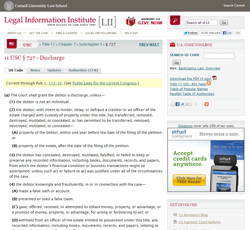*Disclosure required by 11 U.S.C. § 528(a)(3): We, the law office of Tom Scott & Associates, P.C., are a debt relief agency. We help people file for bankruptcy relief under the Bankruptcy Code.
Q: A state court judge orders the mother to pay the father $20,000.00 following a contempt hearing as a penalty for actual costs of petitioner’s attorney fee. The award is a contempt penalty following the Judge’s determination that the mother has not been paying student loans in a timely manner thus harming the father’s credit and that the mother has not complied with a parenting time order. Is that penalty dischargeable in Bankruptcy?
A: Bankruptcy Code Section 523 provides a list of debts that are not dischargeable in bankruptcy. Specifically 523(a)(7) states: A bankruptcy discharge “does not discharge an individual debtor from any debt – … (7) to the extent that such debt is for a fine, penalty, or forfeiture payable to and for the benefit of a governmental unit, and is not compensation for actual pecuniary loss…”
Under section 523(a)(7), civil contempt sanctions are generally non-dischargeable where, they are imposed to uphold the dignity and authority of the court. For example see U.S. Sprint Communications Co. v. Buscher, 89 B.R. 154, 156 (D.Kan.1988); PRP Wine Int’l, Inc. v. Allison (In re Allison), 176 B.R. 60, 63-64 (Bankr.S.D.Fla.1994). In these cases, the dischargeability of a prior fine was at issue in a subsequent bankruptcy.
A “debtor seeking to discharge a pre-petition sanction faces an uphill battle. While he has the ability under Bankruptcy Rule 4007 to seek a determination of the dischargeability of the sanction in that subsequent proceeding, the bankruptcy court will evaluate and adjudicate the prior debt’s dischargeability guided at least in part by § 523(a)(7). It is for this reason that a representative of a corporate debtor, like Mr. Hansbrough, is not free flatly to ignore the bankruptcy court’s orders, absorb any sanction the court can muster, and then simply file a personal bankruptcy petition before a different court and obtain a discharge as a matter of course.” In Re Hercules Enterprises, Inc., d/b/a JP’s Health Club, Debtor. James Hansbrough, Appellant, v. David Birdsell, Chapter 7 Trustee of Hercules Enterprises, Inc.’s Bankruptcy Estate, Appellee, 387 F.3d 1024 (9th Cir, 2004).
Accordingly, my reading of the Bankruptcy Code is that Section 523(a)(7) creates a two prong test to determine whether a civil contempt action is dischargeable in bankruptcy:
1) The debt cannot be discharged if the penalty is payable to and for the benefit of a governmental unit; AND
2) The debt cannot be discharged if the penalty is not compensation for actual pecuniary loss [a “pecuniary loss” is defined as “a loss that can be evaluated in money terms” (Black’s Law Dictionary)].
In the facts presented, the state court order was that the money be paid directly to the father and not payable to or for the benefit of the any governmental unit. Therefore, the first prong is not met and the debt can be discharged in bankruptcy. The second prong is that the debt cannot be discharged if the debt is not compensation for actual pecuniary loss. Conversely then, the debt is dischargeable in bankruptcy if the penalty is for actual pecuniary loss. In this case, the court order does specifically state that penalty is for actual compensation so it should be dischargeable in bankruptcy.
More importantly, however, is that the divorce decree directed the mother to remain current on student loans and hold the father harmless as a co-debtor. Through issuance of this divorce decree order, the state court has created another potential debt for the mother; that is, the father can collect money for damages if the mother does not remain current on student loans. This potential debt to father will remain in effect until either the student loan is timely paid or the divorce decree order is discharged. A Chapter 7 bankruptcy will NOT discharge any debt to a former spouse that was incurred by the debtor in the course of a divorce. Therefore, if mother files a Chapter 7 bankruptcy and receives a discharge, even if the current $20,000.00 penalty is dischargeable, the underlying order to remain current on student loans is not dischargeable. Accordingly, if the mother ever falls behind on student loans in the future, the father could simply seek another post-discharge contempt order and the mother would have to appear again before an already unhappy judge. Therefore, I would recommend that the mother file a Chapter 13 bankruptcy to attempt a discharge of both the civil contempt penalty as well as the property settlement order.
